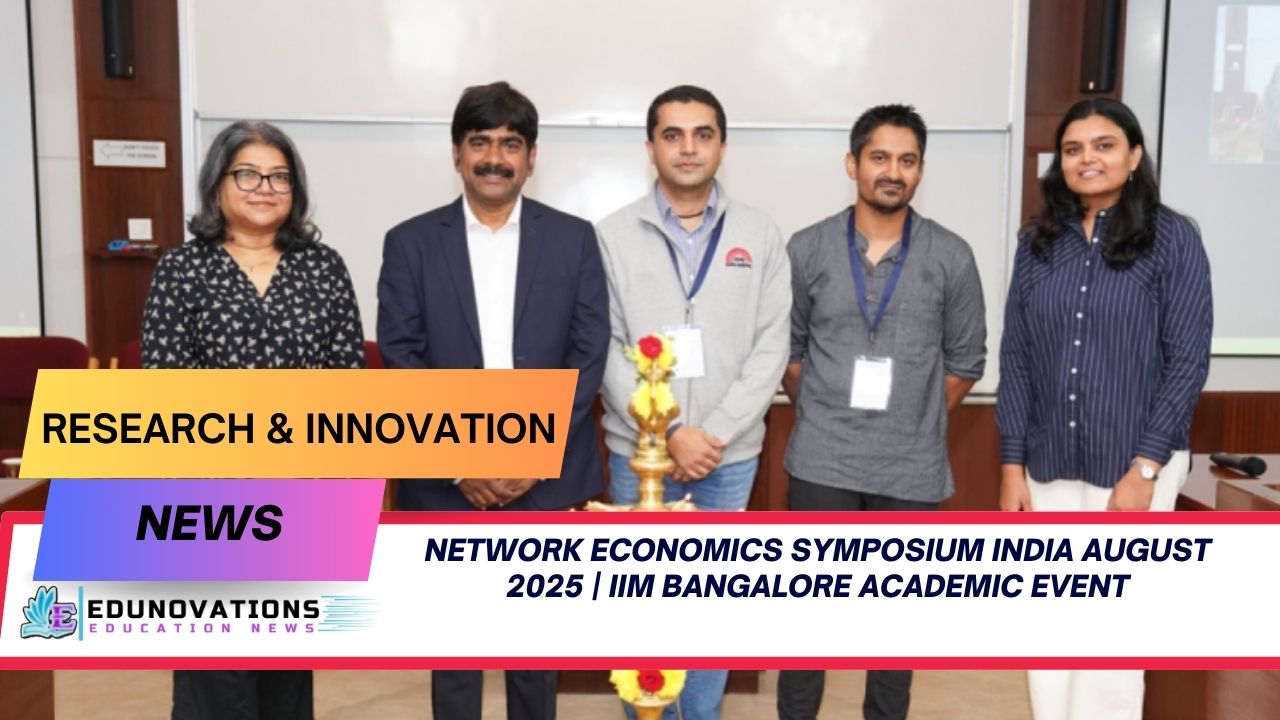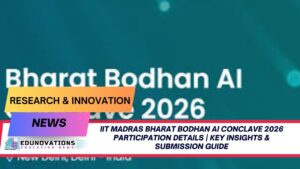Explore the Network Economics Symposium India August 2025 at IIM Bangalore, featuring global experts, workshops, and sessions on experimental design, informal networks, and risk sharing.
Network Economics Symposium India August 2025: A Transformative Academic Event at IIM Bangalore
India is emerging as a global hub for intellectual and academic dialogue, and one of the most anticipated gatherings in this journey is the Network Economics Symposium India August 2025 workshops and sessions hosted by the Indian Institute of Management Bangalore (IIMB). Scheduled for August 28–29, 2025, the symposium aims to bridge the gap between theory and practice in economics while fostering international collaboration. The event has drawn attention from economists, policymakers, and students worldwide, reflecting IIMB’s growing stature as a center of excellence in economic research.
Significance of the Symposium
The symposium is more than just an academic gathering. It represents a convergence of innovative ideas on how networks influence markets, societies, and public policy. Organized by IIMB’s Economics area, this event highlights topics such as informal networks, macroeconomic modeling, risk-sharing practices, and the robustness of theoretical frameworks in applied settings.
What sets this symposium apart is its carefully curated program, offering both high-level keynote addresses and in-depth workshops. Participants will engage with pressing questions: How do networks shape the development process? What role does experimental design play in testing economic theories? How can theoretical insights be applied to fragile and interdependent systems?
Spotlight on the Keynote Address
A major highlight is the keynote lecture delivered by Prof. Arun Chandrasekhar of Stanford University, who was awarded the prestigious Infosys Prize in Economics in 2024. Prof. Chandrasekhar’s research emphasizes how social and economic networks function in developing economies, offering empirical evidence that challenges conventional economic wisdom.
His address will provide insights on the RAF framework—“Generalizability, Experimental Design, and Rashomon Sets”—a cutting-edge concept in economic research. By focusing on how different models can explain similar outcomes, Prof. Chandrasekhar aims to showcase why flexibility and adaptability are vital in policy design. This directly resonates with the growing interest in Prof Arun Chandrasekhar network economics keynote Infosys Prize insights within the global academic community.
Technical Sessions: Bridging Theory and Practice
The symposium includes a wide range of technical sessions designed to foster academic debate and inspire actionable research.
- Informal Networks and Risk Sharing: This session dives into the ways communities, especially in rural or marginalized areas, create informal systems of insurance and support. The focus on informal networks risk sharing development economics seminar makes it highly relevant for both scholars and practitioners.
- Network Theory and Macroeconomics: Experts will explore how networks affect national and global economic systems, including trade, policy coordination, and resilience to crises.
- Rashomon Sets and Experimental Design: In this track, scholars will investigate methodological challenges in ensuring the generalizability of research findings. This directly connects with Rashomon Sets experimental design in economics network research, a theme growing in importance for applied economics.
Workshops for Hands-On Learning
Workshops have been designed for participants who seek practical engagement. Two stand out:
- Introduction to Networks and Dependence – This session will provide a structured overview of how dependence and interconnections shape both micro and macro-level outcomes. It aligns with the long-tail keyword introduction to networks dependence fragility robustness workshop India, offering a direct appeal to learners.
- Fragility and Robustness in What We (Think) Know – Aimed at advanced scholars, this workshop questions assumptions that often go untested in economic research. It is expected to spark debate on how researchers and policymakers interpret fragile systems.
Broader Academic Context
According to IIMB’s faculty, the symposium is part of a larger push to encourage dialogue across disciplines and geographical boundaries. The presence of distinguished speakers and workshops makes it an ideal opportunity for students, young scholars, and policymakers alike.
The event also reinforces India’s position in the global academic ecosystem. With India hosting more international research events, students can connect with global experts without leaving the country, enhancing access to world-class education.
For learners seeking resources to prepare for related subjects, internal links such as NCERT courses, current affairs, notes, MCQ practice, and videos are valuable complements.
Toppers Use Mind Maps to score more than 95%
NCERT Class 11th Commerce Mind Maps
Add to cartOriginal price was: ₹999.00.₹199.00Current price is: ₹199.00.NCERT Class 12th Chemistry Mind Maps
Add to cartOriginal price was: ₹199.00.₹75.00Current price is: ₹75.00.NCERT Class 12th Commerce Mind Maps
Add to cartOriginal price was: ₹999.00.₹199.00Current price is: ₹199.00.NCERT Class 12th Science Mind Maps
Add to cartOriginal price was: ₹999.00.₹199.00Current price is: ₹199.00.NCERT Mind Maps For Class 10th
Add to cartOriginal price was: ₹999.00.₹199.00Current price is: ₹199.00.
Purchase Today
Expert Perspectives
Commenting on the importance of such symposiums, Nobel laureate economist Abhijit Banerjee once observed that “networks shape how information flows, how trust is built, and how communities grow.” While Banerjee is not directly linked to this event, his broader views underscore why gatherings like these matter for both policy and research.
Similarly, the Infosys Prize jury in 2024 praised Prof. Chandrasekhar for “advancing our understanding of social networks in development economics.” Such recognition affirms that the symposium is aligned with globally relevant academic priorities.
Why This Matters for Students and Researchers
Students preparing for higher studies in economics or public policy will find the symposium especially useful. The workshops offer exposure to research methods that are increasingly emphasized in top graduate programs worldwide.
Additionally, attending events like this allows students to network with leading scholars and peers, creating opportunities for collaboration. Supplementary materials like NCERT mind maps and free NCERT PDFs further enhance learning.
Role of Institutions and Technology
Institutions like IIMB play a central role in shaping India’s contribution to global research. By hosting international scholars and fostering collaboration, they ensure that Indian voices are part of critical global debates.
For schools and smaller educational organizations interested in strengthening their academic infrastructure, platforms such as Mart India Infotech offer technological solutions to create professional websites and digital outreach.
Conclusion
The Network Economics Symposium India August 2025 workshops and sessions at IIM Bangalore are not just another academic event—they are a significant step forward in global economic dialogue. With participation from internationally recognized scholars like Prof. Arun Chandrasekhar, the event promises to redefine how networks and economics are studied and applied. From Rashomon Sets and experimental design to informal networks and fragility in systems, the symposium offers insights that will resonate far beyond the campus.
For students, policymakers, and academics alike, this is an opportunity to engage with the future of economics in a setting that combines intellectual rigor with practical application.
FAQs
Q1. What is the focus of the Network Economics Symposium India August 2025 workshops and sessions?
The symposium focuses on network theory, experimental design, informal networks, risk sharing, and robustness in economics.
Q2. Who is delivering the keynote at the symposium?
Prof. Arun Chandrasekhar from Stanford University, recipient of the Infosys Prize 2024 in Economics, is delivering the keynote.
Q3. What does Prof Arun Chandrasekhar network economics keynote Infosys Prize insights cover?
His keynote will focus on networks in developing economies, the RAF framework, and Rashomon Sets in economic research.
Q4. What topics are covered in Rashomon Sets experimental design in economics network research?
This session discusses how multiple models explain outcomes, emphasizing generalizability and robustness in research.
Q5. Why is informal networks risk sharing development economics seminar significant?
It highlights how communities develop informal systems to manage risks, a key concept in development economics.
Q6. What is the aim of the introduction to networks dependence fragility robustness workshop India?
It introduces participants to dependence in networks and explores the fragility and robustness of economic systems.
Q7. When and where is the symposium being held?
The symposium is scheduled for August 28–29, 2025, at the Indian Institute of Management Bangalore.
Q8. How can students prepare for topics discussed at the symposium?
Students can use resources like NCERT courses, notes, MCQs, and videos to build foundational knowledge.
Q9. Is the symposium only for academics?
No, it is open to policymakers, researchers, and students interested in applied economics and networks.
Q10. How does the symposium align with global academic trends?
It brings global scholars to India, focusing on frontier topics like networks and development, in line with international research priorities.














